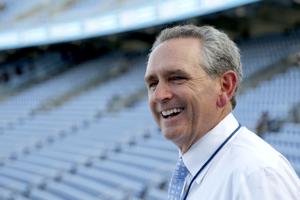North Carolina has charted an unconventional course in appointing its next athletic director, selecting Steve Newmark, an executive from the auto racing world, to succeed Bubba Cunningham in 2026. This decision comes at a pivotal moment as college athletics enters a new era of revenue sharing. Cunningham will conclude his 15th season as UNC’s athletic director before transitioning to an advisory role next summer. The university announced these changes on Tuesday, notably without a public search process or the engagement of a search firm.
The announcement coincides with the official start of revenue sharing, allowing schools to directly compensate athletes following a $2.8 billion antitrust settlement. This shift underscores the rapidly evolving landscape of college sports, prompting UNC to look beyond traditional athletic administration for leadership. “Now it’s time for somebody else to continue to build on the things we’ve had and make sure that we continue to grow as a department, and support the kids,” Cunningham stated. “We’ve got revenue shares, we’ve got to figure that out. And so … I just think now’s the time.”
Transition and Succession Planning
The transition plan includes a two-year contract extension for Cunningham, who will advise Chancellor Lee Roberts and Newmark on athletic projects. This move fulfills discussions from Cunningham’s last contract extension in 2022 about establishing a succession plan. The timing aligns with significant changes in college athletics, such as the use of name, image, and likeness (NIL) rights by players and the introduction of revenue sharing.
UNC’s decision to hire Newmark without a traditional search process was approved by Roberts and the president of the state’s public university system. “The chancellor has the authority to forgo a search process for high-level positions when circumstances call for it,” explained school spokesman Kevin Best. “We believed the best fit for our program could be identified through a deliberate, careful and quiet process.”
Newmark’s Unique Background
Newmark, who has led Roush Fenway Keselowski Racing for 15 years, brings a wealth of experience in sponsorships, marketing, and contract negotiations. His initial focus at UNC will be on “revenue-driving initiatives,” particularly in the men’s basketball and football programs. Newmark’s appointment reflects the broader changes in college athletics, as schools seek leaders with diverse skill sets to navigate new financial realities.
“I look forward to working with Bubba and the entire Tar Heel Nation to continue to elevate UNC’s status as a premier brand in college sports with top-tier programs across the board,” Newmark stated. “With collegiate athletics undergoing massive changes at all levels, UNC is well positioned to take advantage of the new landscape.”
A Chapel Hill native, Newmark has deep ties to UNC, having served on advisory committees for high-profile hires and initiatives. Before his tenure at RFK Racing, he was a partner at a Charlotte-based law firm, specializing in sports and entertainment law, with experience working with major athletic conferences.
Cunningham’s Legacy and Future
During his tenure, Cunningham oversaw significant achievements, including the elevation of Hubert Davis as men’s basketball coach and the hiring of Bill Belichick as football coach. He also guided UNC through a complex NCAA infractions case, which concluded without penalties in 2017. Under his leadership, UNC’s athletic programs secured numerous national championships and individual titles.
Cunningham’s influence extended beyond UNC, as he recently completed a five-year term on the NCAA Tournament selection committee, serving as chairman last year. His continued involvement in an advisory capacity ensures a smooth transition and continuity in leadership as UNC adapts to the evolving collegiate sports environment.
Looking Ahead
The appointment of Steve Newmark as UNC’s future athletic director marks a significant shift in the university’s approach to athletic leadership. As college sports undergo transformative changes, UNC’s decision to embrace a leader with a non-traditional background highlights its commitment to innovation and adaptability. The coming years will test Newmark’s ability to leverage his diverse experience to maintain and enhance UNC’s reputation in the competitive landscape of college athletics.
As the university navigates these changes, the collaboration between Cunningham and Newmark is expected to drive strategic initiatives that capitalize on new revenue opportunities and uphold UNC’s legacy of athletic excellence.
